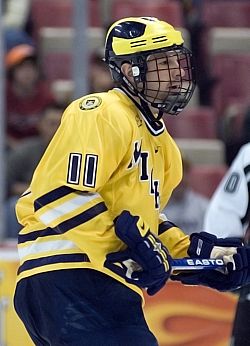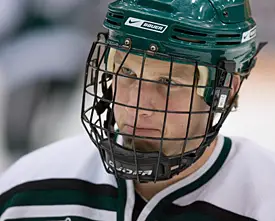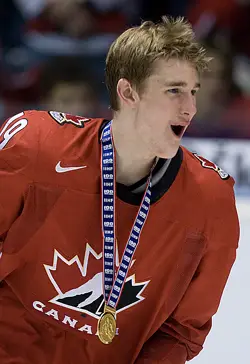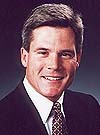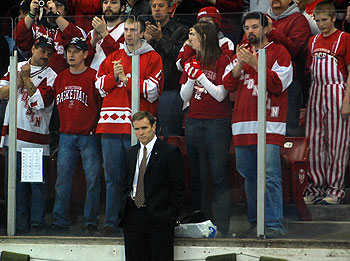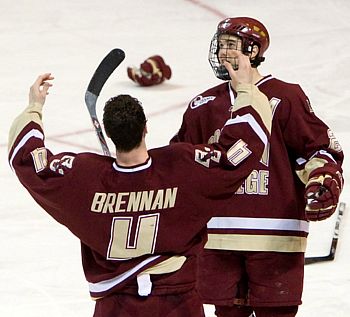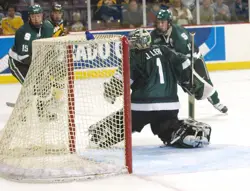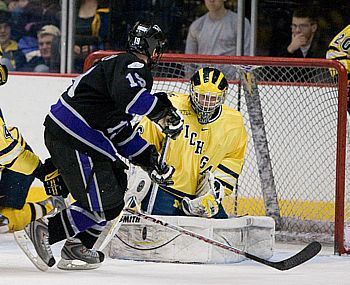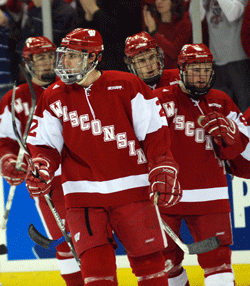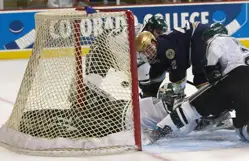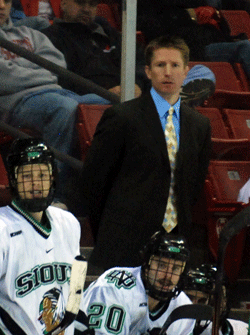St. Norbert senior goaltender Kyle Jones has been selected the USCHO.com National Player of the Year. The North Delta, British Columbia native led the Green Knights to their first national title this season, recording one of the best seasons ever by a Division III goaltender.
Jones posted a 1.09 GAA and a .950 save percentage. He set Division III records for shutouts in a season (10) and for a career (25) including shutouts in the Division III semifinals and finals.
USCHO.com has also named St. Norbert coach Tim Coghlin National Coach of the Year. Coghlin led the Green Knights to a 27-1-4 record and their first ever national title this season.
The winners and all-star teams are selected by the USCHO.com staff. A complete list follows:
East First Team
Goal — Longo, Keith, Jr., Hobart
Defense — Arthur Fritch, Sr., Colby
Defense — Tom Maldonado, Sr., Middlebury
Forward — Rick Cleaver, Sr., Norwich
Forward — T.J. Kelley, Sr., Colby
Forward — Neil Trimm, Sr., Neumann
East Second Team
Goal — Casey Tuttle, So., Elmira
Defense — Nick Dumoulin, Jr., Elmira
Defense — Nick Rolls, Jr., Plattsburgh
Forward — Nikita Kashirsky, Sr. Norwich
Forward — Matt McGilvary, Johnson & Wales
Forward — Michael Richard, Sr., Elmira
Honorable Mention:: Ryan Donovan (UMass-Boston), Mark Ehl (New England), Ryan Ellis (Oswego), Greg Parker (Conn. College), Josh Reber (Colby), David Thompson (Norwich), Trevor Turner (New England), Mike Westerman (Bowdoin)
East Rookie Team
Goal — Bryan Hince, Plattsburgh
Defense — Paul Conter, Southern Maine
Defense — Karl Linden, Elmira
Forward — Dylan Clarke, Plattsburgh
Forward — Justin Fox, Salem State
Forward — Ryan Leary, Bowdoin
Honorable Mention: Ryan Corry (Plattsburgh), Cody McKinney (Colby), Sylvain Messier (Norwich), Alex Myolenko (Skidmore), Eric Tufman (Mass-Boston), Jason Yuell (Curry), Matthew Wallace (Hobart)
West First Team
Goal — Kyle Jones Sr., St. Norbert
Defense — Jim Henkemeyer, Sr., UW-River Falls
Defense — Jack Wolgemuth, Jr., UW-Stout
Forward — Marc Belanger, Sr., St. Norbert
Forward — Tyler Dahl, Sr., UW-River Falls
Forward — Dustin Fulton, Jr., Hamline
West Second Team
Goal — Chad Beiswenger, Jr., UW-Superior
Defense — Adam Davis, Jr., St. Thomas
Defense — Joe Long, Jr., Hamline
Forward — Pat Borgestad, Sr., UW-River Falls
Forward — Derek Hansberry, Jr., UW-River Falls
Forward — Adam Krug, Jr., Adrian
Honorable Mention: Tyler Chestnut (St. Thomas), Derek Hanson (UW-Stout), Jared Hummel (Hamline), David Martinson (Gustavus Adolphus), Andrew Panchenko (St. Thomas), Derek Paige (UW-Superior), Quinn Waller (Adrian), Jason Woll (MSOE)
West Rookie Team
Goal — Thomas Speer, UW-Stevens Point
Defense — Nick Tabisz, St. Norbert
Defense — Quinn Waller, Adrian
Forward — Mike Glaesmer, St. Mary’s
Forward — Eric Miller, Adrian
Forward — Shawn Skelly, Adrian
Honorable Mention: Jared Hummel (Hamline), Rob Johnson (St. Thomas), Josh Swartout (Gustavus Adolphus)
D-III Player of the Year: Kyle Jones, St. Norbert
Honorable Mention: Rick Cleaver, Norwich
D-III Coach of the Year: Tim Coghlin, St. Norbert
Honorable Mention: Bob Emery (Plattsburgh), Tim Ceglarski (Elmira), Ron Fogarty (Adrian)
